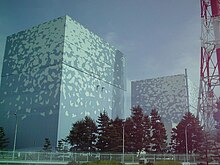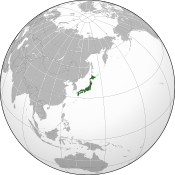Japanese nuclear plant operators ordered to compensate affected families amid calls for prime minister to resign
Saturday, April 16, 2011

Image: kawamoto takuo.

Image: Shawnc.

Image: U.S. Air Force.
The operators of the stricken Fukushima I nuclear power plant in northeast Japan have been ordered to pay compensation to families affected by the ongoing crisis at the site, amid calls for the resignation of the Japanese prime minister over how he is handling the crisis, which has now been designated on par with the Chernobyl disaster in 1986.
Japanese officials ordered TEPCO to pay ¥1 million (US$12 thousand, £7.35 thousand) to each household affected by the crisis, which the company says will add up to approximately ¥50 billion (US$599 million, £367 million). Earlier this week, officials announced plans to expand the nuclear exclusion zone around the plant to include five more communities as radiation continues to leak from the plant. Pressure is now mounting for the resignation of Naoto Kan, the Japanese prime minister, for his handling of the nuclear crisis in Fukushima; some of his opponents have called for an independent inquiry into how he reacted to the disaster.
TEPCO has this week announced plans to move equipment to higher ground after a series of strong aftershocks that have hampered efforts to repair the crippled facility. Officials have warned some of the nuclear rods in the reactors at the plant may have been damaged, but likely remain intact. Workers at the plant are still fighting a desperate battle to stop radiation leaking from the plant, but have been hit by constant setbacks.
Earlier this week officials of NISA, the Japanese government nuclear authority, said officials had upgraded the crisis to a level seven on the International Nuclear Event Scale—the same applied to the Chernobyl disaster—designating the crisis as a "major accident" with "wider consequences" than previously thought. "We have upgraded the severity level to seven as the impact of radiation leaks has been widespread from the air, vegetables, tap water and the ocean," he said.
Akihito, the emperor of Japan, travelled to the northeast of the country on Wednesday to visit survivors of the tsunami which devastated the area last month against a backdrop of mounting anger over the at a nuclear plant, where technicians are continuing to battle to cool the reactors as radiation continues to leak from the site. Akihito and his wife, Michiko, met people displaced by the tragedy at two emergency shelters in Asahi, near the northeast coast where the tsunami struck. 140,000 people are now living in emergency shelters across Japan after their homes were destroyed in the disaster.
Emergency workers, dressed in protective white suits, gloves and goggles, have began searching for bodies within the exclusion zone around the stricken nuclear plant, much of which was left muddied and destroyed by the tsunami. Officials fear up to 1,000 bodies may be among the wreckage in the area. Search efforts in the area have been put off because of high radiation levels, but authorities want to recover bodies before they deteriorate to the point where they become a health hazard and impossible to identify.
| I am physically and mentally worn out by the nuclear crisis. They [the government] have done nothing so far to help us. | ||
—Yoshihisa Kato, businessman in Fukushima | ||
Japanese television reported radiation levels in the ocean off the plant have fallen but remain high. Health officials have found radiation 25 times the legal limit in fish caught south of the nuclear plant, and radioactivity had been detected in 11 different vegetables in Fukushima earlier this week. The death toll from the disaster is continuing to rise; Japanese police have reported 13,300 people have been confirmed dead and more than 15,000 are still missing.
Another aftershock, with a magnitude of 6.1, struck on Thursday morning, following a more powerful one, measuring magnitude 6.6, on Monday. Hundreds of aftershocks have rattled northeast Japan in the month since the initial earthquake. Before the aftershock on Monday, people across Japan marked the one month anniversary of the earthquake with a moment of silence, and Kan paid tribute to countries who had sent aid to the stricken country. However, Kan has been criticised for his handling of the nuclear crisis. An entrepreneur in Fukushima, Yoshihisa Kato, complained about how he had been left abandoned by the government. "I am physically and mentally worn out by the nuclear crisis," he said. "They have done nothing so far to help us."
Related articles
- "Crisis at stricken Japan nuclear plant escalates to level of Chernobyl; six killed in aftershock" — Wikinews, April 12, 2011
- "Japanese nuclear officials race to avoid disaster as radiation levels in sea rocket" — Wikinews, March 31, 2011
- "Situation at damaged nuclear power plant remains 'very grave', says Japanese Prime Minister" — Wikinews, March 25, 2011
Sources
- Matt Smith. "Nuke plant owner to pay $600 million—for now" — CNN, April 15, 2011
- Mari Yamaguchi, Tomoko Hosaka. "Japan emperor makes first trip to disaster zone" — Miami Herald, April 14, 2011
- "Japanese Plant Operators Brace for Continuing Aftershocks" — Voice of America, April 14, 2011 (PUBLIC DOMAIN)
- Mari Yamaguchi, Tomoko Hosaka. "Japan's emperor makes first trip to disaster zone" — MSNBC, April 14, 2011
- April 16, 2011
- 2011 Sendai earthquake and tsunami
- Published
- Archived
- Japan
- Disasters and accidents
- Asia
- Nuclear accidents
- Earthquakes
- Tsunamis
- Crime and law
- Nuclear power
- Fukushima Daiichi Nuclear Power Plant
- Fukushima Prefecture
- Tokyo Electric Power Company
- Nuclear and Industrial Safety Agency
- Naoto Kan
- Akihito
- Missing persons
- Fish




